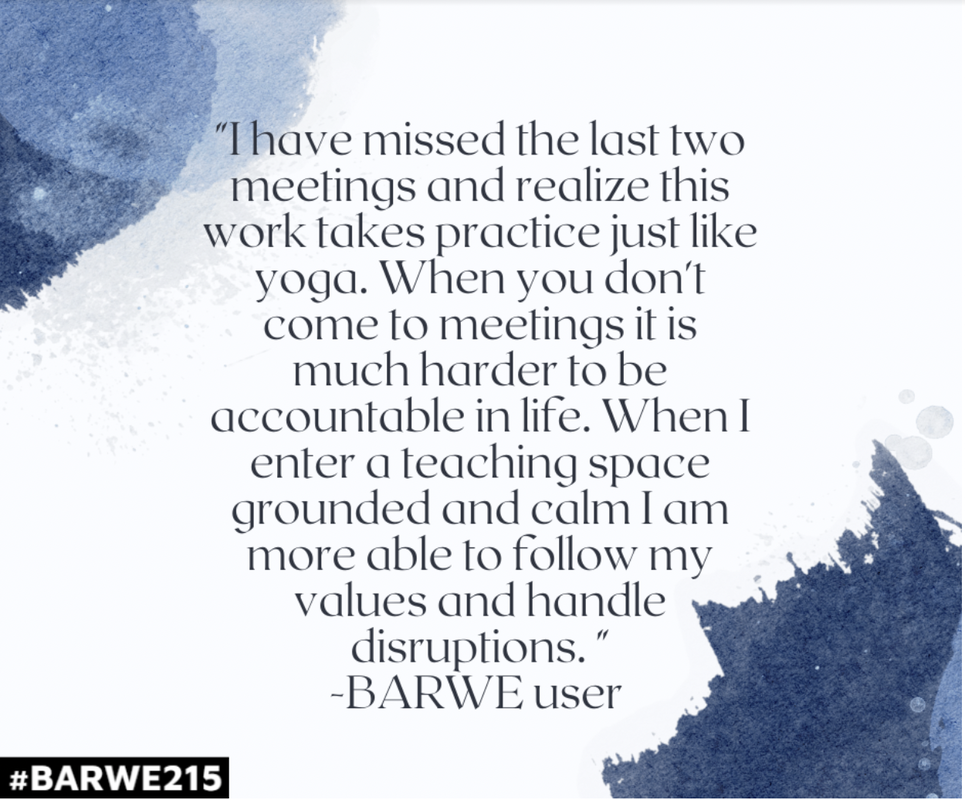- About Us
-
Inquiry Series
-
Current Year 23 - 24 School Year
>
- June: End of Year Reflection
- May: How do we support students of color navigating admissions processes?
- April: How do we support students and teachers when they face backlash for speaking out for racial justice?
- March: How can we find inspiration in white antiracists currently doing this work?
- February: How can we learn from white anti-racists of the past?
- January: How can you build solidarity across differences?
- December: How do we give ourselves space to process when we feel stuck/overwhelmed/enraged?
- November: How do we fight back against attacks on racial and gender justice education?
- October: Why is it important to understand both the history of CRT and what it has come to mean?
- September: How do we keep the focus on race as we engage in antiracist reflective practice?
- Previous Inquiry Series
- Inquiry Resources >
-
Current Year 23 - 24 School Year
>
-
Summer Events
- Writings
If this is your first year doing this series as a group, we recommend working through Inquiry Series 3.
Don't forget to give us feedback!
Overview:
Over the past several months, we have been digging into the topic of accountability, first focusing on our own definitions and experiences and then focusing on accountability in regards to our students and classrooms. In discussing our students and classrooms, we were mindful of the power that educators are given over students and discussed ways to build transformative relationships built on care, rather than furthering the imbalance of power. Over the next couple months, we are shifting our focus to accountability within your school or organization. An analysis of power is once again necessary, and even more complex as it includes relationships between administrators, classroom teachers, and non-classroom staff. The white supremacy characteristic, outlined by Tema Okun, of the right to comfort and fear of conflict is often ingrained in schools so deeply that accountability is rarely a topic that is discussed. Or, in many cases, schools may use the term accountability, but really mean punishment and therefore miss the opportunity for healing and community building.
This month, we encourage groups to spend their time discussing what accountability looks like at your school, keeping all of these power relationships in mind. Do accountability measures at your school feel coercive or transformative? For example, what are people held accountable to: is it shared values or is it test scores? We encourage you to build upon the ideas from your ongoing reflection notebook and discussions from previous months as you dive into this conversation. We have provided discussion questions to begin this conversation, and we encourage groups to tailor conversations to your particular situations.
Primary Resources:
We are not providing a primary resource this month. We want groups to have time to dive into an analysis of accountability at their school or educational context and reflect on what they’ve read so far during this inquiry series. We encourage groups to start with journaling time before discussion. Also, make time for all three discussion questions this month.
The Accountability Resources document is available if your group would prefer an article to read. We will continue adding resources and linking this document for the remainder of the year. If you know of any resources that you think should be on this list, please email us at [email protected].
Guiding Questions:
1. What does accountability look like at your school? Who gets to talk about and define the things you are held accountable to?
2. We suggest focusing on one of these depending on what feels best for your group. Remember to keep analysis of racism and commitment to antiracism at the core of these discussions.
Facilitation Reference Guide:
Feedback Form:
As we grow in year four, we hope that one person in your group can take a few minutes to fill out our feedback form to let us know how it went.
Here is a takeaway from a previous meeting:
Don't forget to give us feedback!
Overview:
Over the past several months, we have been digging into the topic of accountability, first focusing on our own definitions and experiences and then focusing on accountability in regards to our students and classrooms. In discussing our students and classrooms, we were mindful of the power that educators are given over students and discussed ways to build transformative relationships built on care, rather than furthering the imbalance of power. Over the next couple months, we are shifting our focus to accountability within your school or organization. An analysis of power is once again necessary, and even more complex as it includes relationships between administrators, classroom teachers, and non-classroom staff. The white supremacy characteristic, outlined by Tema Okun, of the right to comfort and fear of conflict is often ingrained in schools so deeply that accountability is rarely a topic that is discussed. Or, in many cases, schools may use the term accountability, but really mean punishment and therefore miss the opportunity for healing and community building.
This month, we encourage groups to spend their time discussing what accountability looks like at your school, keeping all of these power relationships in mind. Do accountability measures at your school feel coercive or transformative? For example, what are people held accountable to: is it shared values or is it test scores? We encourage you to build upon the ideas from your ongoing reflection notebook and discussions from previous months as you dive into this conversation. We have provided discussion questions to begin this conversation, and we encourage groups to tailor conversations to your particular situations.
Primary Resources:
We are not providing a primary resource this month. We want groups to have time to dive into an analysis of accountability at their school or educational context and reflect on what they’ve read so far during this inquiry series. We encourage groups to start with journaling time before discussion. Also, make time for all three discussion questions this month.
The Accountability Resources document is available if your group would prefer an article to read. We will continue adding resources and linking this document for the remainder of the year. If you know of any resources that you think should be on this list, please email us at [email protected].
Guiding Questions:
1. What does accountability look like at your school? Who gets to talk about and define the things you are held accountable to?
2. We suggest focusing on one of these depending on what feels best for your group. Remember to keep analysis of racism and commitment to antiracism at the core of these discussions.
- Are there systems for addressing conflicts between peers? What about conflicts involving unequal power relationships?
- Have you used your BARWE group as a way to discuss conflicts at your school? What is your capacity for holding each other accountable?
- Are there ways that your BARWE group is specifically accountable to colleagues of color?
Facilitation Reference Guide:
- Set a day and time for your group to meet. Make sure to send reminders.
- Remind participants to bring pen and paper. Journaling is important this month to prepare for discussion.
- Prepare yourself to facilitate by reading through our Norms and Discussion Protocol.
- Pass the Hat and collect donations for Interrupting Criminalization this month.
- Complete the Feedback Form.
- Prepare yourself for March by setting a date and time, inviting colleagues, and looking out for our next Discussion Guide on March 1st.
Feedback Form:
As we grow in year four, we hope that one person in your group can take a few minutes to fill out our feedback form to let us know how it went.
Here is a takeaway from a previous meeting:
Pass The Hat:
In addition to being accountable to our colleagues and students of color, we believe it is important to be financially accountable to people of color who are doing this work on a daily basis. Each month, we will recommend an organization led by people of color, in education and beyond, doing the work of pushing for justice.
At the end of each monthly discussion, pass a hat (or a box) and collect donations for the designated organization. You can then have one group member go online and donate in the name of your school. If you want, you can add “Building Anti-Racist White Educators” after your school name.
This month, we encourage you to donate to Interrupting Criminalization. Interrupting Criminalization is an initiative led by researchers Mariame Kaba and Andrea J. Ritchie. The project aims to interrupt and end the growing criminalization and incarceration of women, girls, trans, and gender nonconforming people of color for criminalized acts related to public order, poverty, child welfare, drug use, survival and self-defense, including criminalization and incarceration of survivors of violence. Interrupting Criminalization’s resources have been essential to our accountability series this year. Donate here.
In addition to being accountable to our colleagues and students of color, we believe it is important to be financially accountable to people of color who are doing this work on a daily basis. Each month, we will recommend an organization led by people of color, in education and beyond, doing the work of pushing for justice.
At the end of each monthly discussion, pass a hat (or a box) and collect donations for the designated organization. You can then have one group member go online and donate in the name of your school. If you want, you can add “Building Anti-Racist White Educators” after your school name.
This month, we encourage you to donate to Interrupting Criminalization. Interrupting Criminalization is an initiative led by researchers Mariame Kaba and Andrea J. Ritchie. The project aims to interrupt and end the growing criminalization and incarceration of women, girls, trans, and gender nonconforming people of color for criminalized acts related to public order, poverty, child welfare, drug use, survival and self-defense, including criminalization and incarceration of survivors of violence. Interrupting Criminalization’s resources have been essential to our accountability series this year. Donate here.
Are you starting to feel the midyear doldrums? Winter blues leading to lower turn out at BARWE meetings? Generally looking to sustain and build momentum at this mid-year point? Then join us on Tuesday, February 28 from 7-8:30pm ET for BARWE Winter Office Hours on Zoom. This is a place to connect, problem solve, and share with BARWE users from across the country. Register for the event here: http://bit.ly/3H2rgsl
There will be 2 differentiated break out rooms based on what you need. One room will focus on how to start a BARWE group. Another will work through a problem of practice protocol to problem solve specific issues you are facing.
There will be 2 differentiated break out rooms based on what you need. One room will focus on how to start a BARWE group. Another will work through a problem of practice protocol to problem solve specific issues you are facing.

